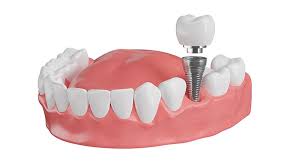Missing teeth can impact your confidence, ability to chew comfortably, and overall oral health. When it comes to restoring your smile, two of the common options are dental implants and dentures. Understanding the key differences between implants and dentures can help you make an informed decision that fits your lifestyle and long-term dental goals.
Implants and Dentures
Dental implants are an advanced form of permanent tooth replacement available through implant dentistry. These titanium posts are surgically placed into the jawbone, where they fuse with the bone tissue over several months. A crown, bridge, or denture is then attached to the implant, creating a stable foundation that mimics the natural tooth roots.
Dentures, on the other hand, are removable prosthetic devices designed to replace one or more missing teeth. Traditional dentures rest on the gums and rely on suction, adhesives, or clasps for retention. They replace only the visible portions of teeth, unlike tooth implants that replace both roots and crowns. Modern dentures are available in partial and complete varieties, depending on the number of teeth that need replacement.
Pros and Cons of Dental Implants
Dental implants offer several key advantages for replacing permanent teeth. They provide stability and comfort compared to removable options. Since implants fuse with the jawbone, they prevent bone loss that usually occurs after tooth extraction. This preservation maintains facial structure and prevents the sunken appearance often associated with long-term tooth loss.
The durability of dental implants makes them a long-term investment. With proper care, tooth implants often last 25 years or more. They also allow you to eat any food without restrictions, unlike some denture wearers who must avoid certain hard or sticky foods. Also, implants require the same care as natural teeth, making maintenance straightforward.
Dental implants also present some drawbacks. The initial cost is significantly higher than dentures. The surgical procedure requires sufficient bone density and healthy gums for success. Some patients may need bone grafting before implant placement, which can extend the treatment timeline. The entire process from surgery to final restoration often takes several months to complete.
Pros and Cons of Dentures
Dentures provide an affordable solution for restoring missing teeth without surgery. They replace multiple teeth simultaneously, making them practical for patients with extensive tooth loss. The non-invasive nature of denture treatment makes it suitable for patients who may not qualify for surgery due to health conditions or insufficient bone density.
Modern dentures also offer improved aesthetics and function compared to older versions. Partial dentures help maintain the position of remaining teeth, preventing further shifting. The treatment timeline is relatively short, allowing patients to receive their new teeth within weeks rather than months.
Dentures do have limitations that affect daily life. They may slip or move during eating or speaking in the initial adjustment period. Certain foods become difficult to eat, and denture adhesives may be necessary for better retention. Dentures also require removal for cleaning and soaking overnight.
Factors to Contemplate
Several key factors influence the choice between dental implants and dentures. Your overall health and bone density play fundamental roles in determining candidacy for implant surgery. Age, while not a barrier for either option, may influence healing time and long-term expectations.
Dentures require periodic replacement and adjustments, adding to long-term costs. Lifestyle factors matter as well. Active individuals may prefer the stability that implants provide. Patients who prioritize convenience might appreciate that implants require no special maintenance routines. Those seeking a quicker solution may find dentures more appealing due to the shorter treatment timeline.
Schedule a Dental Implants Appointment Today
Both implants and dentures restore missing teeth, but the best choice depends on your circumstances and your dentist’s recommendations. Dental implants offer better stability, durability, and bone preservation benefits. Dentures offer a convenient, non-surgical option for replacing multiple teeth. Contact a dental implant specialist today to explore your options for permanent teeth replacement.
- Choosing the Right Plastic Surgeon for Your Cosmetic Procedure
- Understanding Different Types of Laser Treatments for Skin Rejuvenation
- Why a Family Dentist is Key for Maintaining Oral Health
- The Benefits of Regular Visits to a Wellness Spa
- Exploring the Emotional and Psychological Triggers of Eating Disorders


Leave a Reply